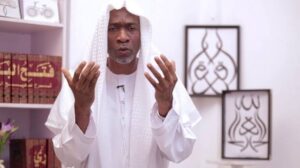[ad_1]
Leading Islamic scholars in Nigeria, Prof Abdurrazaq Kilani, Imam Nojeem Jimoh and Asst Prof. Lukman Raimi have raised concerns over the wanton misuse of social media by a section of Muslim youths whose only activities are to exchange barbs and find faults in others.
The scholars who spoke in separate interviews with Muslim News described the situation as disturbing and worrisome, noting it is against the ethics of Islam.
Lately, there has been a growing tendency, especially among Muslim youths who trade insults on social media that attack each other’s ideological leanings including the older generation of scholars.
The scholars also pointed out that most people who parade themselves as scholars today in Nigeria are not qualified because what they have acquired is elementary knowledge of Islam.
‘Idaadi, thanawi certifications do not make Islamic scholars: Imam Nojeem Jimoh
“It’s for the social media scholars to know that ‘idaadi (primary school level), and thanawi (secondary school level) of education in Islamic Studies do make anyone a scholar. You wouldn’t find a primary or secondary school student claiming to be a scholar in any field at all,” the Chief Imam of Lighthouse Mosque in Lekki, Sheikh Nojeem Jimoh said.
He added, “People imagine themselves to be scholars just because they can speak the Arabic language.
“Those who attended good primary and secondary schools come back speaking the English language very well. This doesn’t make them scholars. Why is it different from those who studied Islam? The primary and secondary levels of Islamic education do not make one a scholar. The madrasah graduates should recognise this.”
“The very people who are supposed to guide the ummah are full of confusion, mutual-ridiculing, anger and mannerless interactions.” – Imam Nojeem Jimoh
Imam Nojeem Jimoh, who observed that the worst kind of Da’wah is finding faults in others and insulting them, urged the social media community to avoid this category of ‘scholars’.
“I urge social media users generally to try and identify who the real scholars are among us and stick to them. There are among these social media scholars whose only Da’wah is to find the fault in the Da’wah of other people. They have nothing to share with anyone other than what they perceive is wrong with other people’s Da’wah. For me, these are the worst kinds of Daee (callers) among us. How can somebody’s da’wah only be to look for what is wrong in the da’wah of others and that’s all he has to share with people? I call on social media users to cut out these kinds of ‘scholars’ from their lives,” he said.

No true knowledge of Deen can be acquired on social media: Prof. Kilani
For his part, the Founder of Al-Usrah, Prof. Abdulrazaq Kilani, noted that real possessors of Islamic knowledge are no longer celebrated, as social media scholars have taken over the show.
He, therefore, warned Muslims to be cautious about how and sources of their knowledge, emphasising that no true knowledge of the deen can be acquired on social media
“The real possessors of knowledge are not celebrated or listened to, to have sound knowledge. What we have are mainly social media speakers looking for traffic on their social media platforms to receive money from the platforms. The more you insult good people, the more people want to listen and it is more money.”
“The people who parade themselves as scholars in Nigeria are not real scholars but students. Thanawiyah is SS3. Even a graduate needs more knowledge to make meaningful impact. The real scholars are abused and insulted on daily basis.” Prof. Kilani
Kilani, a professor of Islamic studies at University of Port Harcourt, drew the attention of those who have made insulting scholars on social media as their Da’wah focus on the hadith of the muflis (the bankrupt).

“Those who have taken insulting of scholars as their Da’wah focus should remember the Hadith of muflis (the bankrupt) on the day of Qiyamah.
“Many will come with salat, fasting, hajj and lots of good deeds but will lose them because they have insulted others while on earth. Insulting Muslims is sinful according to the authentic Hadith of the Prophet (SAW). It is against Islamic morality of good manners and treatment of others,” the Don noted.
He urged youths to demonstrate a keen interest in acquiring a sound knowledge of Islam from reputable scholars, adding, “There is no half measure in understanding the teachings of Islam; it requires total commitment.”
Brunei’s scholar condemns misuse of social media
Also speaking, the former Amir (President) of The Muslim Congress (TMC), Assistant Prof. Lukman Raimi, who is currently resident in Brunei, a South-Asian country, also condemned the misuse of social media among netizens in the country.
According to him, “In America, Europe, and Asia, including the Arab world, Islamic scholars from multidisciplinary fields exert socio-economic influence on science, IT, robotics, and business. Unfortunately, Islamic scholars in Nigeria stir up controversy and engage in unnecessary polemical issues on social media platforms.”

He described the verbal attacks on social media among Islamic scholars in Nigeria as shameful and discouraging.
“I have repeatedly observed the shameful, discouraging, and unnecessary polemical debates, verbal attacks, and counterattacks on social media, among Islamic scholars in Nigeria.
“When I was the Amir of the Muslim Congress (TMC), the purveyors of controversy and hate mongers in the name of Islam tried to lure our organization into unhealthy debates on social media platforms aimed at dividing Muslims. The leadership of TMC had strategically evaded the devil’s plans! Instead, we organized a webinar for Muslims on the pros and cons of social media platforms.”
“Islamic scholars in Arab world are making impacts in science, IT, robotics and business. Islamic scholars in Nigeria are creating needless polemics on social media platforms.” – Prof. Raimi
Raimi, an Assistant Professor and Program Coordinator for Entrepreneurship, Universiti Brunei Darussalam, Brunei, advised that people should seek sincere knowledge and make use of social media responsibly.
“Don’t follow the crowd and commit sins! Be original and avoid being used as a bully and social media warrior to protect the interests and lineages of some groups. We may act collectively as a group for good and bad deeds, but we are individually accountable to Allah.
“Regarding contentious issues posted on social media platforms that cause different opinions, before supporting or attacking as a user or follower, you should be guided by the principles of unity, brotherhood, respect, consideration, compassion, and generosity.”
In this short interview, the immediate former Amir of The Muslim Congress (TMC) shed light on the topic…
MN: How did we get here?
Asst Prof.: Looking back, I believe we got into this terrible situation because of three causal factors. The first factor is Nigeria’s lack of structured coordination of religious affairs. The three levels of government in the country control almost everything (culture, politics, economy, health, media, films, judiciary, birth, and death matters) except religion. This liberal policy has, over the years, opened the door for incompetent and mediocre scholars to take centre stage as leaders in mosques, jurists, and even as speakers at Islamic events, radio and television programmes. This is not the trend in developed and emerging countries.
I have seen the pragmatic and workable models of coordination of religious affairs in Turkey, Morocco, Malaysia, Brunei, and Saudi Arabia, among others. In these countries and several others, the affairs of Muslims are managed by the Ministry of Religion under the direction of qualified mufti and learned Islamic scholars with degrees (MA, LLM, PhD) in Usul al-Fiqh, hadith and Qur’anic studies). The Ministry of Religious Affairs also appoints and certifies imams, jurists, preachers, and spokesmen for Islam to prevent quacks from short-changing and misleading the Muslim communities. Everything is free here in Nigeria. Once selfish scholars with Thanawiyah certificates (SSS3 equivalent) have access to Facebook, YouTube and Instagram, they abandon Islamic modesty in preaching and teaching! They brag, insult, threaten and humiliate their fellow Muslims!
The second causative factor is that most selfish scholars in Nigeria lack international exposure on a variety of issues ranging from public speaking to the ethics of debate and the ethics of correcting erring scholars to the application of Islamic orthodoxy to topical issues. Due to poor visibility, they cannot see beyond their local surroundings and intellectualism. They centralize trivial issues of organizational affiliation, nationalism, and ideologies, and trivialized central issues of unity, brotherhood, moderation, respect for elders and humility in action and speech.
The third factor is the phenomenon of unnecessary competition that has erupted among Nigerian scholars of different ideologies such as Ahlus Sunnah, Salafiyyah, Sufi and Ikhwaniyy. Each ideological school or group uses everything, legal and extra-legal, to prove the validity of its arguments and positions on various Islamic issues raised on social media platforms. Unfortunately, the core teachings of Islam are lost. Those who yearn to learn Islam on social media platforms have been recruited as social media warriors and foot soldiers to defend each group’s diabolical agenda. This is unhealthy for the Nigerian Islamic Ummah that is just evolving!
MN: What is your advice to those youth who insult scholars?
Asst Prof.: I advise the youth to avoid insulting Islamic scholars even if they do not belong to your ideological groups because the rank of a scholar in Islam is very high. Allah (May He be Exalted) says: “Allah will exalt in degree those of you who believe, and those who have been granted knowledge.” [Surat Al Mujadalah: 11]. Our teacher and mentor, the Messenger of Allah (peace be upon him) said: “It is not one of us, he who does not respect old people, show mercy to young people, and know the right of scholars.” [Reported by Imam Ahmad and Al Hakim in Sahih Al Jami` As-Saghir, 5443].
MN: What is your advice to innocent social media users who are mostly the victims of this act?
Asst Prof.: My advice to innocent social media users who are mostly victims of this act is to use social media responsibly to sincerely seek, share and apply knowledge to gain Allah’s pleasure on Judgment Day. Don’t follow the crowd and commit sins! Be original and avoid being used as bullies and social media warriors to protect the interests and lineages of some groups. We may act collectively as a group for good and bad deeds, but we are individually accountable to Allah. Regarding contentious issues posted on social media platforms that cause different opinions, before supporting or attacking as a user or follower, you should be guided by the principles of unity, brotherhood, respect, consideration, compassion, and generosity.
Post Views: 339
[ad_2]
Source link
